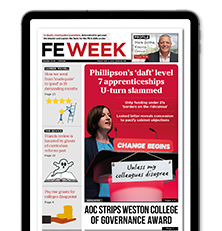Labour manifesto pledge: Reintroduce the 16-19 Education Maintenance Allowance (EMA)
Adam Bradford argues AGAINST
I am a passionate believer in the power of education to unlock potential and change young people’s lives for the better. It is actually for that reason that I am very surprised at Labour’s announcement to potentially bring back Education Maintenance Allowance for college students.
I am sure for many students and their parents this policy announcement will have been music to their ears. But what does a reintroduction of EMA actually represent?
The cold, hard truth of the matter is that youth unemployment is still high. Economic prospects for our generation are uncertain and it is my strong belief that our education system is preparing students for 21st century jobs, some of which do not even exist yet. So why are we incentivising and subsidising our students by giving away tax payers’ money so they can buy fast food and cheap alcohol in their college years? I am making a broad generalisation here but through my experience in college and speaking at colleges across the country for the past eight years, I can clearly see a gap between the intent of EMA and its actual usage.

It would be fantastic to live in a world where we can believe these payments would support transport to and from home, basic meals and study supplies. The sad reality is that millennials do not see it as such.
I had a conversation with Hattie Wrixon, founder of UnisNotForMe, a website that promotes person-focused careers and the other options available to students besides the traditional higher education options. She said to me: “Interestingly enough, we did a quick poll on Twitter to see the general consensus of making university free again and the majority of people said they thought it was not a good idea. We should be focusing our efforts on providing the best possible route and start for our students – whether that is academic or vocational.
“Teachers must stop concentrating on exam ‘grades’ but instead the journey of their students. Often students are put under such pressure to pass exams that if they don’t, they’re considered a failure.
Why are we giving away tax payers’ money so students can buy fast food?
“Sometimes we need to remind ourselves that failure only means not reaching your goal and everyone’s goals are unique to the individual. For example if someone wanted to get 11 A*s at GCSE and only got ten, they might consider that a fail. However, someone who was told they would never pass their English literature exam and manages a C – now that might be considered a great success!”
Hattie makes a good point that Labour might be hosting the wrong conversation here. What we really need is a government and sector leaders who promote the best possible life outcomes for young people; above and beyond grades, performance tables, benefits and perks.
Yes, EMA might make the college experience more manageable and palatable for students, particularly those from low-income households. I still ask the question, how do we teach these young people the resilience and financial management skills they need for the real world? I go so far as to liken this system to the benefits system: free money is not a reality in the working world – so why should it be an option and a perceived reality in our younger years?
Now, as educators and developers of young people, let’s think: does throwing money at our students make them resilient, independent and enterprising – ready for the tough challenges of the 21st century world?
Adam Bradford is a social entrepreneur and Queen’s Young Leader from Sheffield








“free money is not a reality in the working world – so why should it be an option and a perceived reality in our younger years?” Good point. From now on my kids can buy their own shoes. Pocket money? You must be joking.